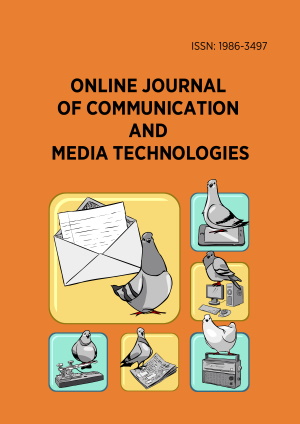Research Article
Surf’s up: Deep-Diving Through Hurricane Katrina’s Unsearchable Digital Past
More Detail
1 University of Mississippi. U.S.A.* Corresponding Author
Online Journal of Communication and Media Technologies, 7(3), July 2017, 133-145, https://doi.org/10.29333/ojcmt/2603
OPEN ACCESS 2370 Views 1628 Downloads
ABSTRACT
Almost since their inception, social media platforms have been valued as acritical resource for sharing news and information during times ofcrisis; as such, several strategies for archiving that information have been put into place. No such strategies had yet been put in place in the late 1990s and early 2000s, during the advent of web-based blog publishing, the precursor to today’s social media. The fact that much of this user-generated historical text is subject to random erosion has largely escaped notice. A qualitative analysis of the archives of more than 300 Gulf-coast-based blogs published before, during and after Hurricane Katrina suggests that an important part of that history has already been lost.
CITATION (APA)
Joyce, C. (2017). Surf’s up: Deep-Diving Through Hurricane Katrina’s Unsearchable Digital Past. Online Journal of Communication and Media Technologies, 7(3), 133-145. https://doi.org/10.29333/ojcmt/2603
REFERENCES
- Anonymous. (2012).Bit rot.The Economist,28 April. Available at: http://www.economist.com/node/21553445
- Carr, N. (2013).All Can Be Lost: The Risk of Putting OurKnowledge in the Hands of Machines. The Atlantic, 23 October. Available at: http://www.theatlantic.com/magazine/archive/2013/11/the-great-forgetting/309516/
- Carvin, A. (2005).CNN, Katrina and the rhetoric of war. In: Katrina Aftermath. Available at: http://katrina05.blogspot.com/2005/09/cnn-katrina-and-rhetoric-ofwarzone.html(accessed 1 June 2014).
- Cegłowski, M. (2014).The Internet with a Human Face. Report for Beyond Tellerrand, 20 May. Dusseldorf, Germany.Available at:http://idlewords.com/bt14.htm
- Cotton, D. (2014).Big Red blog.E-mail interview conducted 10 August.
- Delacroix, SE. (2005).In the Wake of Katrina: A Surgeon'sFirst-HandReport of the New Orleans Tragedy, Medscape General Medicine, 7(3), 56. Available at: http://www.ncbi.nlm.nih.gov/pmc/articles/PMC1681680
- Miller, A., Roberts, S. & LaPoe, V, (2014).Oil and water: Media lessonsfrom Hurricane Katrina and the Deepwater Horizon disaster. Oxford: University Press of Mississippi
- Earl, J. &Kimport, K.(2011).Digitally Enabled Social Change:Activism in the Internet Age. Cambridge, MA: MIT Press.
- Howard, P. (2011).Forget me net, not. (2014) Newsweek Global, 163(2), 1.The Digital Origins of Dictatorship and Democracy:Information Technology and Political Islam. New York: Oxford University Press
- Lepore, J. (2015).The Cobweb.New Yorker, 90(45), 34.
- Kahle, B. (2015).Locking the Web Open, a Call for aDistributed Web. Report for the Ford Foundation NetGain Conference, Toronto ON, 11 February. Available at:http://blog.archive.org/2015/02/11/locking-the-web-open-a-call-for-adistributedweb/
- King, P. (2006). Readers e-mails on draft, the truth about NewOrleans, Sports Illustrated 12 May.Available at: https://web.archive.org/web/20060512081449/http://sportsillustrated. nn.com/2006/writers/peter_king/05/02/mmqbte/index.html(accessed 2 April 2015).
- Klein, M., Van de Sompel, H., Sanderson, R., Shankar, H., Balakireva, L., et al.(2014) Scholarly Context Not Found: One in Five Articles Suffersfrom Reference Rot.PLoSONE 9(12): e115253. doi:10.1371/journal.pone.0115253
- Ford Foundation. (2015).Leading Foundations Join Together to Launch Initiative to Build a Stronger Digital Society. Available at:http://www.fordfoundation.org/newsroom/news-from-ford/940 (accessed 10 February 2015).
- Lueck, T. (2014).Internet Archive: Digital Library of Free Books, Movies,Music, and Wayback Machine/The Internet ArchiveCompanion. American Journalism, 31(2), 2 doi: 10.1080/08821127.2014.905381
- Maness, C. (2015). All My Blogs Are Dead. In: The Awl.Available at:http://www.theawl.com/2015/02/all-my-blogs-are-dead (accessed 2 February 2015).
- Norman, J. (2005). Eye Of The Storm. In: Dancing with Katrina. Available at: http://dancingwithkatrina.blogspot.com/2005_09_01_archive.html (accessed June 1 2014).
- Olivier, D. (2005).Notes from the Diaspora. In: Slimbolala. Available at: http://slimbolala.blogspot.com/2005/09/notes-from-diaspora.html (accessed 2 April 2015).
- Ostertag, S.F., and Ortiz, D.G. (2015). 'Katrina Bloggers Activate!': TheLong-Term Effects of Digital Media on Civic Participation. Sociological Inquiry, 85(1), 28 54.doi:10.1111/soin.12060
- Pignetti, D. (2010).Writing to (Re)New Orleans: The Post-Hurricane KatrinaBlogosphere and Its Ability to Inspire Recovery PhD GraduateThesis, University of San Francisco, USA. Available at: http://scholarcommons.usf.edu/etd/3437
- Plyer, A. (2003).Orleans Parish Data and Information Pre-Katrina. In: Data Center Research. Available at: http://www.datacenterresearch.org/prekatrina/orleans/index.html (accessed 15 June 2015
- SalahEldeen, H.M. & Nelson, M.L. (2013).Resurrecting My Revolution:Using Social Link Neighborhood in Bringing Context to theDisappearing Web. In Proceedings of Theory and Practice of Digital Libraries (TPDL 2013) pp. 333-345 Paphos, Cyprus
- Skillings, J.(2015).Facebook to allow 'legacy contacts' for when you die. In: CNET. Available at:http://www.cnet.com/news/facebook-to-allow-legacy-contacts-for whenyou-die (accessed 12 February 2015).
- Streitfeld, D. (2014). Internet Archive Aims to Preserve All ofCreation. New York Times, 3 November, B6.
- Taylor, A.L. (2014). Personal Archiving: Preserving our Digital Heritage.Technical Services Quarterly 31(4), 431.doi:10.1080/07317131.2014.943081
- Winer, D. (2010).Leslie Harpold's archive. In: Scripting.Available at http://scripting.com/stories/2010/01/23/leslieHarpoldsArchive.html (accessed 3 November 2014).

 The articles published in this journal are licensed under the CC-BY Creative Commons Attribution International License.
The articles published in this journal are licensed under the CC-BY Creative Commons Attribution International License.